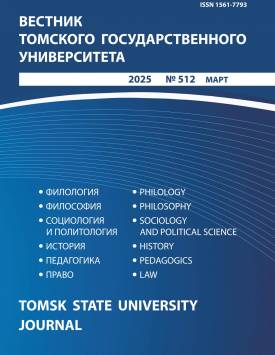Refining the conceptual and categorical apparatus for investigating crimes involving drops and drop handlers in the digital environment
The subject of the research in the article is the debatable issues concerning the nature and legal status of "drops" and "drop handlers" in the context of investigating crimes in the digital environment. The primary emphasis is placed on the need to refine the conceptual and categorical apparatus to effectively counter new forms of cybercrime. The aim of the article is to substantiate the need to develop and clarify the terminological base used in the investigation of crimes involving "drops" and "drop handlers", to identify gaps and conflicts in the current legislation, and to propose directions for their elimination and integration of relevant concepts into the professional lexicon of legal professionals. The study is based on the analysis of existing scientific approaches to the definition of key concepts related to the phenomenon of "drops", materials of law enforcement practice, as well as data obtained by the authors in the course of empirical research of specialised shadow Internet platforms used to organise criminal activity in this area. The methods of formal logic, semantic analysis, classification, statistical processing of data, as well as the comparative legal method were used in the process of work on the article, which allows comparing the approaches of various researchers to the interpretation of the categories under consideration and to develop the most optimal definitions. Based on the results of the study, the authors conclude that the existing conceptual and categorical apparatus is insufficient and incomplete to adequately reflect the specifics of crimes committed with the use of "drops" and "drop handlers" in the digital environment. There is terminological uncertainty and a lack of unity in the interpretation of basic concepts, which significantly complicates the qualification of the relevant acts and the development of effective countermeasures. Based on empirical data, a classification of "drops" is proposed, which includes categories such as "non-scam-able" and "scam-able", with the specific characteristics of each type described. The typical requirements for candidates for the role of "drop handlers", their functional responsibilities, and the criminal methods they employ were analyzed. Particular attention is paid to the examination of such specific concepts characteristic of the cybercrime domain as "grey card", "manual", "pour", and "seeds". Their content and role in the mechanism of criminal activity are described, and the authors' definitions for these terms are proposed. It is noted that the state of legal regulation in the sphere of countering crimes involving "drops" and "drop handlers" is not sufficient and does not correspond to modern challenges of information society, which substantiates the need for the development and consolidation of clear legal definitions of the relevant concepts, their harmonisation within the framework of an intersectoral approach. The authors declare no conflicts of interests.
Keywords
manual fraud, grey card, conceptual framework, crime investigation, cybercrime, digital environment, drop, drop handlerAuthors
| Name | Organization | |
| Borenstein Anna L. | Southwest State University | annalbor@yandex.ru |
| Kukharev Yuriy S. | Southwest State University | yurij.kuharev@yandex.ru |
| Balashov Konstantin G. | Law Office of Krasnoperekopsky District of Yaroslavl | balashoffkonstantin@yandex.ru |
References

Refining the conceptual and categorical apparatus for investigating crimes involving drops and drop handlers in the digital environment | Vestnik Tomskogo gosudarstvennogo universiteta – Tomsk State University Journal. 2025. № 512. DOI: 10.17223/15617793/512/24
